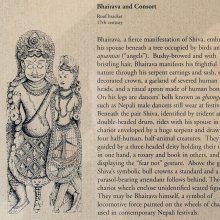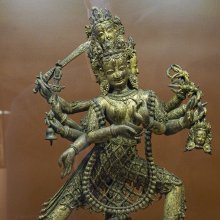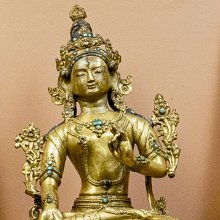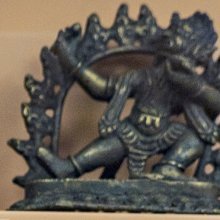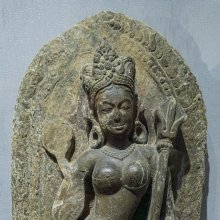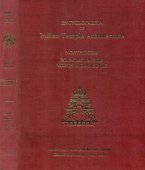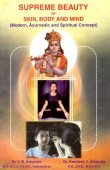Manifest, Manifested, Manifestation, Manifesting: 2 definitions
Introduction:
Manifest means something in Hinduism, Sanskrit. If you want to know the exact meaning, history, etymology or English translation of this term then check out the descriptions on this page. Add your comment or reference to a book if you want to contribute to this summary article.
Images (photo gallery)
(+28 more images available)
In Hinduism
Vedanta (school of philosophy)
Source: ORA: Amanaska (king of all yogas): (Advaita Vedanta)(That which) Manifested (all at once) is denoted by the Sanskrit term Vibhāta, according to the Māṇḍūkyopaniṣatkārikā 3.35cd-36.—Accordingly, while discussing Brahma (without attributes): “That very [mind, free of thought and restrained,] is fearless Brahma, [which is] the light of gnosis [pervading] everywhere. [It is] unborn, devoid of sleep and dreaming, unnamed, formless, manifested [all] at once (sakṛd-vibhāta) and omniscient. [This statement] is not figurative in any way”.

Vedanta (वेदान्त, vedānta) refers to a school of orthodox Hindu philosophy (astika), drawing its subject-matter from the Upanishads. There are a number of sub-schools of Vedanta, however all of them expound on the basic teaching of the ultimate reality (brahman) and liberation (moksha) of the individual soul (atman).
Yoga (school of philosophy)
Source: ORA: Amanaska (king of all yogas): A Critical Edition and Annotated Translation by Jason Birch1) The Manifestation (of the Amanaska-Mudrā) is denoted by the Sanskrit term Āvis, according to the Yogatārāvalī: a short Yoga text of twenty-nine verses presenting Haṭhayoga as the means to Rājayoga (i.e., Samādhi).—Accordingly, while describing the no-mind state: “We see the Amanaska Mudrā manifesting (āvis—āvirbhavantīm) in [those] most eminent sages because [their] breathing has disappeared, [their] bodies are firm and [their] lotus-eyes are half closed”.
2) (Making) Manifest (the highest reality) is denoted by the Sanskrit term Prakāśana, according to the Amanaska Yoga treatise dealing with meditation, absorption, yogic powers and liberation.—Accordingly, as Īśvara says to Vāmadeva: “[...] [Now], I will teach the practice of that, which produces absorption. [...] Sitting evenly on a comfortable seat, one should accomplish the practice of [eliminating] the [lower] Tattvas. Through constant practice, [the Yogin] should make manifest (prakāśana) the highest reality. [...]”.

Yoga is originally considered a branch of Hindu philosophy (astika), but both ancient and modern Yoga combine the physical, mental and spiritual. Yoga teaches various physical techniques also known as āsanas (postures), used for various purposes (eg., meditation, contemplation, relaxation).
See also (Relevant definitions)
Partial matches: Het, Manifest, Te.
Query error!
Full-text (+4201): Vyakta, Pradurbhava, Avirbhava, Prakasha, Abhivyakti, Avishkarana, Avabhasa, Prakata, Vyakti, Avirbhuta, Prakashita, Sphuta, Prakashana, Prakatita, Abhivyakta, Suvyakta, Savishkara, Prakatikarana, Rudra, Pradurbhuta.
Relevant text
Search found 516 books and stories containing Manifest, Het manifest, Manifestation, Manifestations, Manifested, Manifesteert, Manifesting, Manifests, The manifest, The manifestation, The manifesting; (plurals include: Manifests, Het manifests, Manifestations, Manifestationses, Manifesteds, Manifesteerts, Manifestings, Manifestses, The manifests, The manifestations, The manifestings). You can also click to the full overview containing English textual excerpts. Below are direct links for the most relevant articles:
Brihad Bhagavatamrita (commentary) (by Śrī Śrīmad Bhaktivedānta Nārāyana Gosvāmī Mahārāja)
Preface to the First Hindi Edition [Volume 2]
Verse 2.2.214 < [Chapter 2 - Jñāna (knowledge)]
Verse 2.4.158 < [Chapter 4 - Vaikuṇṭha (the spiritual world)]
Tattvasangraha [with commentary] (by Ganganatha Jha)
Verse 2718 < [Chapter 24b - Arguments against the reliability of the Veda (the Revealed Word)]
Verse 2716-2717 < [Chapter 24b - Arguments against the reliability of the Veda (the Revealed Word)]
Verse 2694-2698 < [Chapter 24b - Arguments against the reliability of the Veda (the Revealed Word)]
Brahma Sutras (Ramanuja) (by George Thibaut)
The view that the conscious subject is something unreal, due to the ahamkara, cannot be maintained < [First Adhyaya, First Pada]
Sutra 4.4.3 < [Fourth Adhyaya, Fourth Pada]
Sutra 4.4.19 < [Fourth Adhyaya, Fourth Pada]
Sri Krishna-Chaitanya (by Nisikanta Sanyal)
Chapter 10 - History of Divine Descents (Avataras) < [Volume I - Introductory]
Chapter 6 - History of Theism < [Volume I - Introductory]
Vakyapadiya of Bhartrihari (by K. A. Subramania Iyer)
Verse 1.88 < [Book 1 - Brahma-kāṇḍa (or Āgama-samuccaya)]
Verse 3.9.65-67 < [Book 3 - Pada-kāṇḍa (9): Kāla-samuddeśa (On Time)]
Verse 1.1 < [Book 1 - Brahma-kāṇḍa (or Āgama-samuccaya)]
Agni Purana (by N. Gangadharan)
Related products
(+14 more products available)
